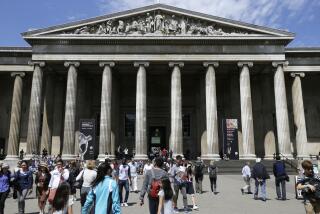Documents Give View of Curator’s Ties to Smuggler
- Share via
ROME — Italian prosecutors told a court Friday that correspondence and other documents show a close relationship between a former antiquities curator at the J. Paul Getty Museum and an Italian convicted last year of smuggling looted artifacts.
The papers, prosecutors said, help prove that the former curator, Marion True, was aware of the illicit origin of objects she acquired for the Los Angeles museum.
True and American art dealer Robert E. Hecht Jr. are on trial in Rome on charges they conspired to receive and illegally import antiquities from Italy. Through attorneys, both have proclaimed their innocence.
In Friday’s session, lead prosecutor Paolo Ferri worked to further establish the link between True and dealer Giacomo Medici, convicted last year on charges similar to those that True and Hecht now face. Medici is appealing a 10-year sentence. In one letter dated June 1987, True apologized to Medici for the Getty’s decision to pass on purchasing a set of Etruscan plates, against her recommendation.
“I hope you will understand that the decision is not mine,” she wrote. “It’s the first time that [museum director] John [Walsh] has actually refused something I have proposed.”
In a second, potentially more incriminating letter, True in 1992 tells Medici in a note that it is “very helpful” to know that a set of ancient pitcher fragments he sent her “come from Cerveteri,” one of the most looted archeological sites in Italy.
Knowing where the antiquities came from meant True had to have been aware of their illicit origin, Ferri said.
Italian law forbids exporting antiquities without government supervision. The prosecution hopes to show that each transaction True and Hecht had with dealers like Medici, reputed to be acquiring ceramics, statues, gold and silver from archeological digs, further establishes their complicity in an illicit scheme.
True’s attorney, Franco Coppi, has previously said he will not dispute that much of the artwork might have been smuggled out of Italy, but that True was unaware of any suspicious origin when she bought items “in good faith.”
Ferri entered some documents into evidence Friday, and he showed other examples to reporters after the hearing ended.
In another letter, dated Sept. 22 but without a year, Hecht thanks True for lunch, mentions the acquisition of a set of Corinthian pots, then describes an apparently foiled acquisition.
“My friend called to say that since the carabinieri [Italian paramilitary police] were looking for a pelike [ancient Greek vase] with the arms of Achilles, he abandoned negotiations,” Hecht wrote. “So I will not have it. Perhaps others may acquire it. Sorry.”
Borghese is a special correspondent and Wilkinson is a staff writer.
More to Read
Sign up for Essential California
The most important California stories and recommendations in your inbox every morning.
You may occasionally receive promotional content from the Los Angeles Times.











